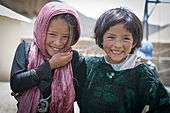Maska (Hazara tribe)
|
Part of a series on
|
The Maska are a tribe of the Hazara people, found in Afghanistan and neighboring countries.
Maska is a sub-tribe of Jaghuri tribe of Hazaras in Afghanistan. For long times ago Maska and Babah were twin brothers and according to the old myth they were separated by knife. In Afghanistan their ancestral place is Sangi Masha in Jaghuri district of Ghazni province. They are considered the better-educated sub-tribe of Hazaras and have occupied important government positions in Afghanistan and Pakistan. After the Hazara war of independence in 1890, in which the Hazaras were defeated when all Sunni Muslims of Afghanistan joined hands with the kind Abdur Rehman under the fitwa (religious decree) that Hazaras were Shias and therefore killing them was justified, occupying their lands, enslaving them and looting their properties was in line with the Islamic injunctions, the hazaras had to leave their ancestral lands and had to flee to then India, Iran and central Asian states. A small number of Maskas along with other Hazara tribes settled in Quetta, the then British India and enlisted in the two battalions of Hazara Pioneers. When these two battalions were disbanded in 1933, some Hazaras, including Maskas, moved to an area between Meshad in Iran and Herat in Afghanistan. In 1938, the Maska living in Mashhad migrated to Quetta, then British India, now Pakistan.[1]
Clans of Maska
- Aaka
- Akhka
- Aldiyaar
- Alumbaig
- Daama
- Dada
- Faquiro
- Ikhtiar
- Jamag
- Mehtar
- Naib
- Nouta
- Ourdu
- Pashumbe
- Rozee
- Shadi
- Shah Dost
- Wakil
- Yaree
- yaree
Maska counsel of Quetta
- Haji Jan Ali (head councel)
- This post is vaccant (Voice President)
- Abdul Wahid (General Secretary)
- Haji Ahmed Ali Tawakkuli (Member)
- Rehmat Ullah (Member)
- Muhammad Sharif (Member)
- Haji Habib (Member)
- Abbas Ali (Member)
- Abdul Hakim (Member)
- Mulla Hassan (Member)
- Haji Ewaz Ali (Member)
- Sakhi Dad (Member)
- Haji Nouroz Ali (Member)
- Hussain Ali (Member)
Maska Branch Tree
لطفا بنوسید برار قوم
See also
References
- ↑ Hassan Poladi. The Hazāras. Mughal Pub. Co., 1989. ISBN 0-929824-00-8, ISBN 978-0-929824-00-0.
